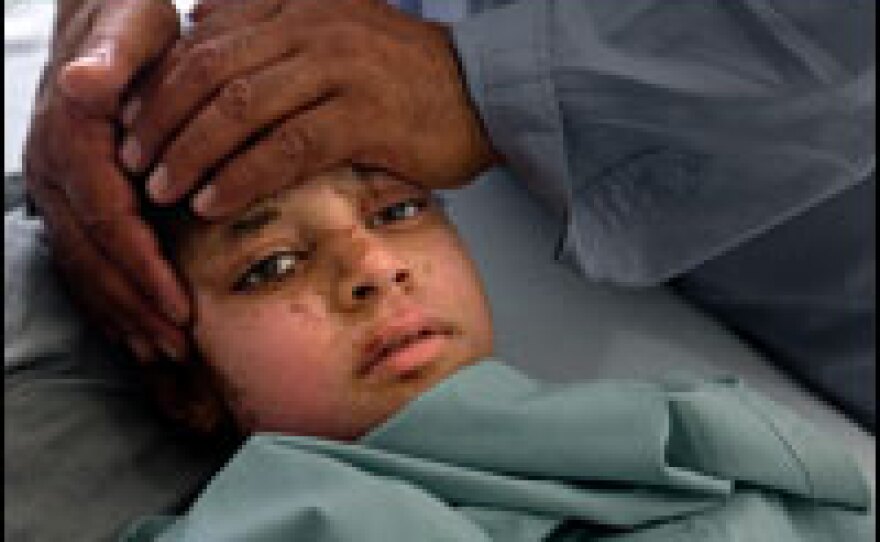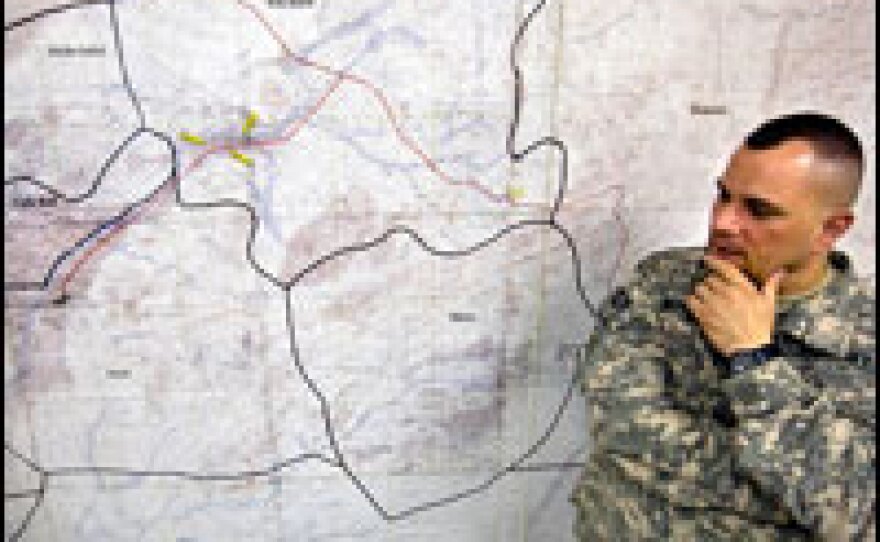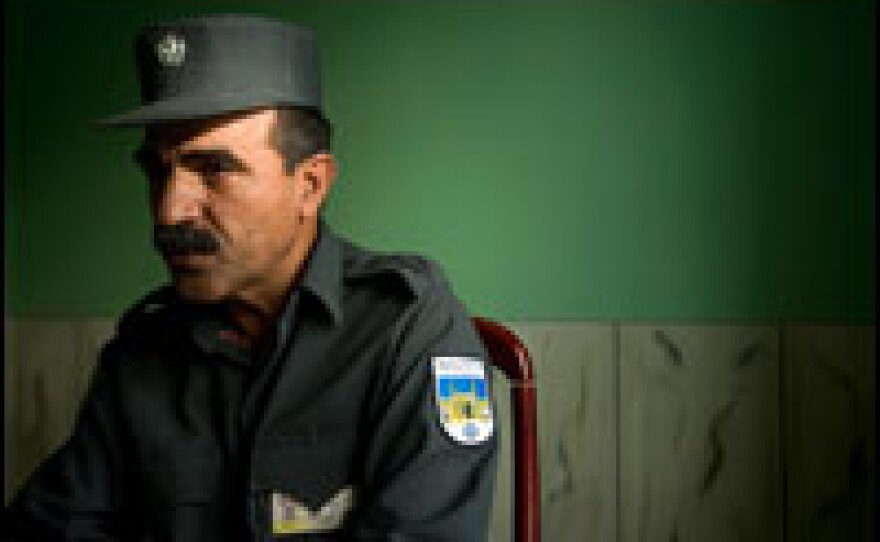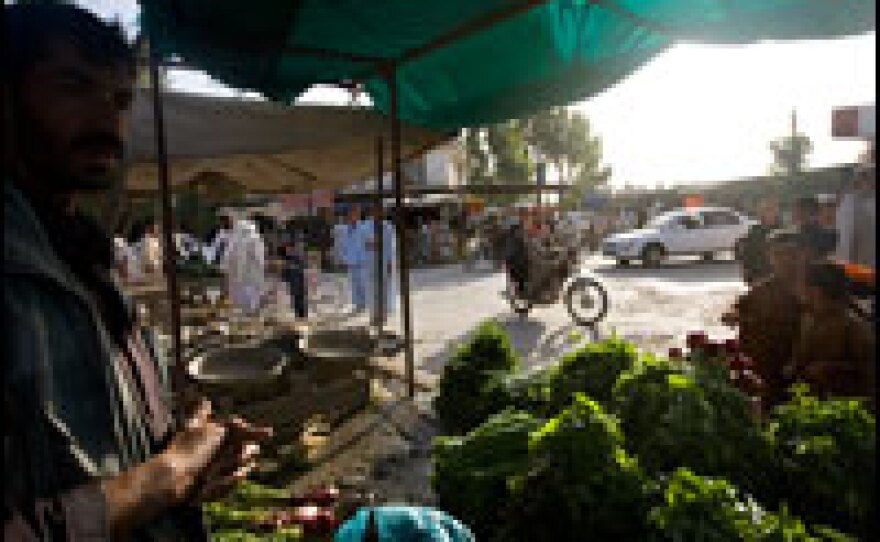



American and Afghan officials will probably never agree on what happened in a remote village in western Afghanistan earlier this month, when up to 140 civilians were killed by what many in that country say were U.S. airstrikes.
But there is less debate over what would have happened if U.S. warplanes hadn't joined in the daylong battle with Taliban fighters. Without the jets, both sides say the nearby capital of Farah province might now be in the hands of the Taliban.
At a dusty checkpoint in the village of Bagh-e-pol, a handful of Afghan policemen with old Kalashnikovs are all that stands between Taliban territory and nearby Farah city.
One of the sentries, Abdul Aziz, said Taliban gunmen in SUVs often drive by late at night and shoot at the policemen. They, in turn, fire back from their mud hut.
Such firefights are a constant reminder of the Taliban threat to Farah, the remote capital of a sprawling province by the same name. Usually, the skirmishes between Taliban fighters and the police don't amount to much — that is, until 15 days ago, when a short drive north of the city, local police officers backed by Afghan soldiers, U.S. military trainers and Special Forces came under heavy attack.
They were outnumbered by militants who fired mortars and other heavy weapons from rooftops in two villages.
"The insurgents were employing very accurate and effective machine gunfire, talking to the personnel that were there," said U.S. Navy Cmdr. Benjamin Nicholson, who heads the American base in Farah city. "It wasn't like, you know, sporadic shooting. It was pinning them down."
The fierce battle ended that night with airstrikes on a village called Garani. The Afghans there say the bombs collapsed a dozen homes inside mud-walled compounds and damaged the local mosque.
Most of the Taliban fighters got away, but Afghan officials say at least two dozen were killed. So were three Afghan police officers. Several more were wounded, as were two members of the U.S. Special Forces.
The villagers in Garani fared much worse. The Afghan government concluded 140 were killed, most of them children. It says more than two dozen were injured.
The U.S. military, which is still investigating the incident, insists that the number of casualties is less than half that.
What caused the casualties is also under debate. Survivors and many Afghan officials say it was the airstrikes carried out by American F-18s, and a B-1 bomber called in from outside Afghanistan.
But the U.S. military says Taliban fighters lobbing grenades killed and wounded villagers.
Influx Of Taliban
What everyone seems to agree on is that hundreds of Taliban fighters had massed around Garani in the week leading up to the deadly clash. Part of the influx is linked to the growing presence of American troops elsewhere in Afghanistan.
"What's happened over time," Nicholson said, "is, as you know, that fighting in the east continues to push insurgents to the south, and now we have more forces in the south and that is continuing to push insurgents to the west, and so now we are having more and more difficulties out here."
The problems are especially noticeable around Garani, which is located in a major poppy-producing district. There are so many militants and criminals in the district that straddles the road linking Farah city to the country's main highway that residents are effectively cut off from the rest of Afghanistan.
Few dare to travel by bus or car anymore, with those who can afford it taking twice-weekly commercial flights on aging Soviet-era planes. And except for the International Red Cross, no independent investigators have been able to get to Garani to see what happened.
'Shadow Government' In Farah
Abdul Ghafar Watandar, the provincial police chief, said foreign militants and Afghan Taliban are flowing into districts surrounding Farah city from their hideouts across the southern border with Pakistan. Their commanders — including a cleric who was the governor of neighboring Nimrooz province when the Taliban ruled Afghanistan — recently formed a "shadow" government in Farah.
Watandar said these new Taliban officials are handing out money and weapons to the impoverished and illiterate majority with the aim of further destabilizing the province.
Unlike previous Taliban cells, this new army of militants seems eager to take on not only the local police, but also the far better trained and equipped Afghan and NATO troops. And Watandar said there aren't enough of those in Farah province, making air support a crucial part of major fights.
"If the American airstrikes hadn't happened that day, there might have been a lot more deaths," Watandar said. "The Taliban had secured themselves good positions on the rooftops and streets of the village, and they wouldn't have left."
Gov. Roohul Amin said the threat the militants around Garani posed to the provincial capital cannot be ignored.
"Actually, they planned to control first the highway and then attack on the city, and it was very important to defeat them and to stop them to not come into the city," he said.
But some Afghan officials and most survivors interviewed said the fighting had slowed, if not stopped, at least a half-hour before the Americans dropped the bombs on the night of May 4.
Wounds And Reparations
In a burn center in the western city of Herat, five female villagers are recovering from serious burns to their faces and limbs that they and their families say were caused by those bombs.
All but one of the patients are children, including Fereshte, who is 5 years old.
She struggles to get comfortable inside her thick bandages, while French nurse Marie-Jose Brunel tries to comfort her.
Her 13-year-old brother, Naeem, watches nearby. He and Fereshte lost their mother. His other two sisters, ages 7 and 12, were also badly burned.
The teen said he and other villagers heard a drone fly overhead. He said everyone scattered.
Fifteen minutes later, Naeem said, another plane came and dropped the bomb that destroyed the compound his mother and sisters were hiding in.
"The Taliban had already left," he said. "They just passed through and went to the river behind our village."
Back in Farah province, members of a senior Afghan delegation from Kabul are giving money to family members of the 140 victims.
Each gets the equivalent of $2,000, a small fortune by Afghan standards. But payment does little to ease the anger survivors feel toward the Americans, including Mohedin, a 55-year-old farmer who, like most Afghans, has no last name.
"The Americans can see something as small as a cell phone from far away," he said, "so how can they with their sophisticated equipment not distinguish between women and children and Taliban fighters?"
Provincial council member Belqis Roshan said incidents like Garani only benefit the Taliban by driving a wedge between Afghans and their government and its Western allies.
"I can tell you for sure that most of the people in Farah are against the Taliban, even the head mullah here," Roshan said, but, these days, it doesn't matter to people whether militants or the government and foreign forces are winning anymore. She said all Farah residents see is their lives being destroyed.
Copyright 2022 NPR. To see more, visit https://www.npr.org. 9(MDAzMjM2NDYzMDEyMzc1Njk5NjAxNzY3OQ001))







